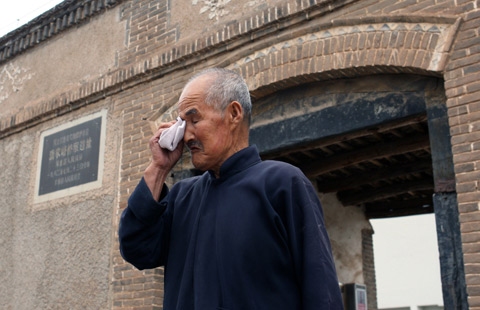Ancient towns in Guilin
Updated: 2014-10-10 10:58Daxu Ancient Town
Daxu Ancient Town is one of the four famous ancient towns in Guangxi province. It was first built in 200 AD; and by the Northern Song dynasty (960-1127), it had become a prosperous business town. During the Ming and Qing dynasties (1368-1911), it was a famous collecting and distributing center of rural fair trade. Today, the architectures of grey bricks and grey tiles built in the Ming or Qing dynasties, the removable wooden structured shop fronts, and the long bluestone pavement all help this ancient town to retain its old ways. Its strong lingering historical and cultural charm makes it absolutely worthy of the fame of being one of the historical and cultural towns of China.
Location: Daxu town, Lingchuan county, Guilin city
Xingping Ancient Town
Xingping is 25 km away from the county seat. With water in the front and hills at the back, the town boasts beautiful landscapes. The pink walls, black tiles, and stone-paved lanes form a beautiful painting along the Lijiang River. There are many historical relics and sites in this little town which are found concentrated in an ancient street and in the fishing village in the town. With a history of nearly 500 years, the fishing village has 48 well-preserved traditional residences which typically represent the architectural style of northern Guangxi during the Ming and Qing dynasties (1368-1911). They have horse head walls, flying eaves, painted rafters and windows with carved patterns.
Location: Xingping township, Yangshuo county, Guilin city
Rongjin Ancient Town
Located in the southeastern part of Pingle county and 25 km away from the county seat, the town is where the Rongjin River and Shajiang River, two tributaries of the Li River, meet. The 1000-year-old ancient street here is well-preserved. The houses along the street are mostly arcade half-timbered houses in the style of folk residences common in the south. The grey bricks and green tiles, overhanging eaves and bracket sets showcase the style of ancient villages and towns in South China, characterized by elegance and primitive simplicity. In the town, the ancient street, ancient banyan trees and ponds exist side by side and, with ancient banyan trees clustering together and ponds scattered here and there, form an attractive landscape unique to ancient towns in the south of the Five Ridges.
Location: Rongjin village, Zhangjia township, Pingle county, Guilin city
Fuli Ancient Town
With a history of more than 1,000 years, Fuli Ancient Town enjoys picturesque and beautiful water and hills and a unique culture. Surrounded on three sides by hills and facing a river on another side, this town has long been renowned for “having the three-sided hills surround the ancient town and one river embracing the green land.” It is a culturally complicated place. The primitive tribal culture – the ancient Nuo Culture – remains intact today. Nuo music and Nuo dances have been well-preserved here. Having been used in music classes by the Mao Shan Religious Sect, Nuo music has been further developed. It is of great historical and artistic value. Location: Fuli township, Yangshuo county, Guilin city
Jiangtouzhou Village
Jiangtouzhou village is located on the west bank of the Hulong River and has a history of more than 1,000 years. In this ancient village, the architectural style of the Ming and Qing dynasties remains intact. All houses are built with grey bricks, grey tiles and timber frames; layers of eaves are well-arranged; dragon-shaped carvings and ornamental engraving showcase the primitive simplicity and elegance. Textual research has shown that about 100 men from this ancient village in the Qing dynasty (1644-1911) alone got official ranks through passing imperial exams. As a saying goes, “the ancient temple stands on the land where lotus flowers blossom, and Jiangtou is the village which produces scholars.” Moreover, the village is home to the offspring of Zhou Dunyi, a well-known writer, philosopher and founder of Neo-Confucianism in the Northern Song dynasty (960-1127).
Location: Jiangtouzhou villiage, Jiuwu twnship, Lingchuan county, Guilin city
- Beijing tackles air pollution for APEC
- Top court acts to curb paid Web posts, deletions
- Ministry issues stern warning to college professors
- Chinese premier criticises lazy officials as corrupt
- Alert continues for smog in North China
- Smog cloaks Beijing
- Holiday spending habits change
- Wooden homes help keep quake casualty figures down
- Rescue continues after SW China quake
- Li's visit to Europe







